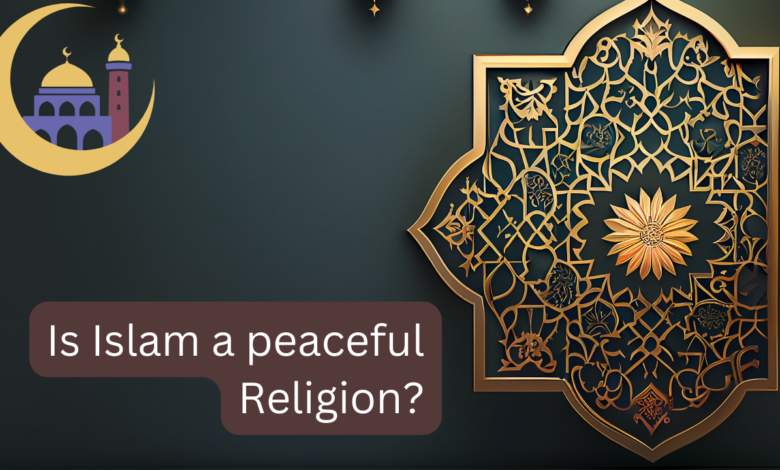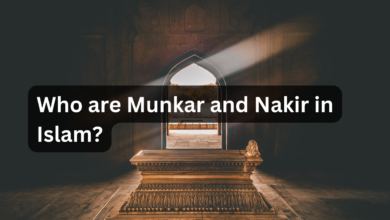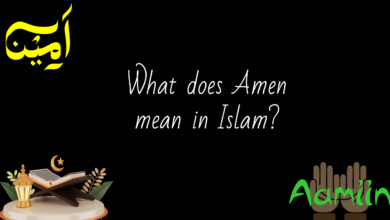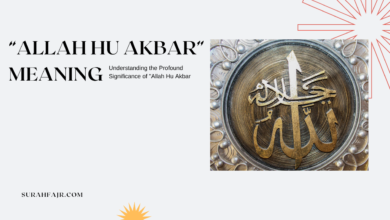
Is Islam a peaceful Religion?
Islam is often described as a religion of peace by its followers. The word “Islam” itself is derived from the Arabic word for peace, “Salaam.” While many Muslims strive to live peaceful lives and interpret their faith in a peaceful manner, like other religions, interpretations of Islam can vary among individuals and communities.

Introduction
The question of whether Islam is a peaceful religion is a topic of significant debate and discussion in today’s world. Islam, like any major religion, is multifaceted, and its interpretation can vary greatly among its followers. It is important to approach this question with an open and nuanced perspective, acknowledging that there are both peaceful and non-peaceful aspects within Islam, as well as diverse interpretations of its teachings.
Foundations of Peace
To understand Islam’s stance on peace, it is essential to examine its foundational principles and teachings. At its core, Islam is built upon the idea of submission to God (Allah in Arabic) and the belief that God is merciful, compassionate, and just. The Quran, Islam’s holy scripture, emphasizes the importance of peace and justice, with verses such as “And the servants of the Most Merciful are those who walk upon the earth easily, and when the ignorant address them [harshly], they say [words of] peace” (Quran 25:63).
Furthermore, the Quran encourages Muslims to engage in acts of charity, kindness, and compassion towards others, regardless of their faith. These principles are deeply rooted in the concept of peace and coexistence.
Islamic History and Peace
Historically, Islam has a complex relationship with peace. The early history of Islam includes instances of military conquests, such as the expansion of the Islamic empire under the Rashidun Caliphs and the Umayyad and Abbasid dynasties. Critics argue that these conquests contradict the religion’s message of peace.
However, proponents of Islam contend that these military campaigns were not inherently aggressive but rather defensive responses to external threats. They also argue that Islam’s early history includes instances of peaceful coexistence with other religious communities, such as Jews and Christians, in territories under Islamic rule, where they were allowed to practice their faith freely.
Also Check
- Heaven in Islam
- Who are Munkar and Nakir in Islam?
- Why did Prophet Muhammad (PUBH) marry Hazrat Khadijah?
- Fasting in Islam
- Islam in Bible
Islamic Ethics of War
Islam provides a set of ethical guidelines for warfare, often referred to as “Just War Theory.” These guidelines dictate that war should be a last resort, undertaken only when diplomacy and peaceful means have failed. The Quran explicitly forbids the killing of non-combatants, women, children, and the destruction of civilian property during wartime. The faith also encourages the humane treatment of prisoners of war.
It is crucial to recognize that, like in many religions, interpretations of these guidelines can differ significantly. Some extremist groups have used a distorted interpretation of Islamic teachings to justify violence and terrorism. However, the vast majority of Muslims reject such interpretations and advocate for peace and coexistence.
Contemporary Views on Peace
In today’s world, the majority of Muslims around the globe live peaceful lives, striving for harmony within their communities and with those of other faiths. Organizations and individuals within the Muslim community are actively working to promote interfaith dialogue, tolerance, and understanding.
Muslim-majority countries, such as the United Arab Emirates, Qatar, and Malaysia, have embraced the concept of peaceful coexistence and religious tolerance, hosting diverse populations with different faiths and cultures.
Conclusion
In conclusion, the question of whether Islam is a peaceful religion is not easily answered with a simple “yes” or “no.” Like any major religion, Islam contains both peaceful and non-peaceful elements. Its teachings emphasize peace, justice, and compassion, while its historical record includes periods of military expansion.
However, it is essential to recognize that the majority of Muslims interpret Islam as a religion of peace and strive to live their lives in accordance with these principles. The actions of extremist groups should not be used to judge the entire faith, just as the actions of a few individuals should not define an entire religion.
Promoting peaceful coexistence and understanding among people of different faiths is a shared responsibility. By engaging in respectful dialogue and learning about the diverse interpretations within Islam, we can foster a more inclusive and harmonious world for all.

FAQs about Is Islam a Peaceful Religion?
Is Islam a peaceful religion?
Islam is often described as a religion of peace by its followers. The word “Islam” itself is derived from the Arabic word for peace, “Salaam.” While many Muslims strive to live peaceful lives and interpret their faith in a peaceful manner, like other religions, interpretations of Islam can vary among individuals and communities.
Are all Muslims peaceful?
Just as with any religious or cultural group, Muslims are diverse, and their beliefs and actions can vary widely. The majority of Muslims are peace-loving and seek to live their lives in accordance with Islamic principles, which include values like compassion, justice, and kindness. However, there are also individuals or groups who interpret Islam in a way that justifies violence, and they do not represent the beliefs of all Muslims.
Does Islam promote violence?
Islam, like many major religions, has scriptures that contain both peaceful and potentially contentious passages. Interpretation of these texts can vary widely, and there are both peaceful and extremist interpretations of Islam. Many Muslims argue that Islam promotes peace and emphasizes the importance of compassion and forgiveness.
What does Jihad mean in Islam?
Jihad is often misunderstood as solely meaning “holy war.” In Islam, Jihad means “struggle” or “striving.” It can refer to an internal struggle against one’s own sinful tendencies (Jihad al-Nafs) or an external struggle in various forms, including self-defense and efforts to promote justice and righteousness. The concept of Jihad is not synonymous with violence, and the majority of Muslims interpret it as a non-violent struggle.
Have there been violent acts committed in the name of Islam?
Yes, there have been instances where individuals or groups have committed violent acts in the name of Islam. These actions have been widely condemned by Islamic scholars and leaders, who argue that they do not reflect the true teachings of Islam. It’s essential to differentiate between the actions of a few extremists and the beliefs of the entire Muslim
What is the role of Islamic leaders in promoting peace?
Islamic leaders, scholars, and clerics often play a crucial role in promoting peace within the Muslim community and beyond. They advocate for understanding and dialogue, condemn violence, and work towards resolving conflicts through peaceful means. Many Islamic organizations also focus on humanitarian efforts and social justice.
How can non-Muslims better understand Islam’s stance on peace?
Non-Muslims can better understand Islam’s stance on peace by engaging in respectful dialogue with Muslims, reading about the religion from reputable sources, and learning about its history and teachings. It’s important to recognize that Islam, like other religions, has a diversity of perspectives and interpretations.
Are there organizations or initiatives that promote peace in the name of Islam?
Yes, there are numerous organizations and initiatives around the world that promote peace in the name of Islam. These organizations often focus on interfaith dialogue, conflict resolution, humanitarian aid, and education to counteract extremism and promote a peaceful interpretation of the religion.
What are some common misconceptions about Islam and peace?
Common misconceptions include equating all Muslims with extremists, assuming that Islam inherently promotes violence, and misunderstanding the concept of Jihad. It’s essential to approach these topics with an open mind and seek accurate information.
How can individuals work towards peace and understanding between different faiths?
Individuals can work towards peace and understanding by engaging in respectful interfaith dialogue, learning about different religions and cultures, and promoting tolerance and acceptance. Building bridges of communication and empathy can contribute to a more peaceful world for all.






